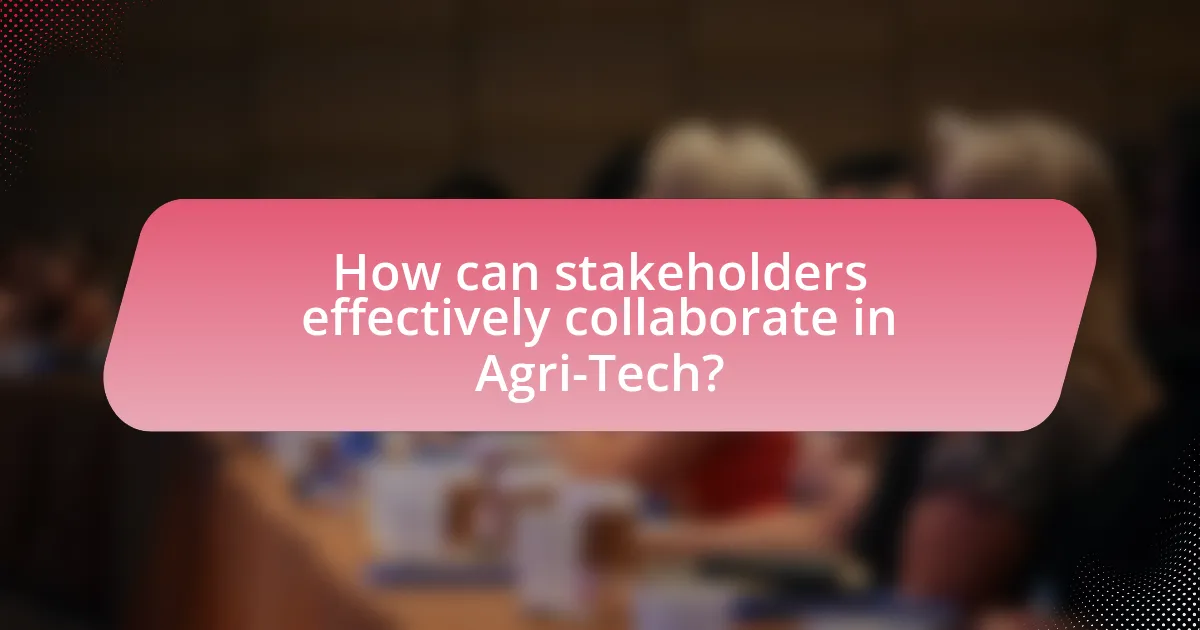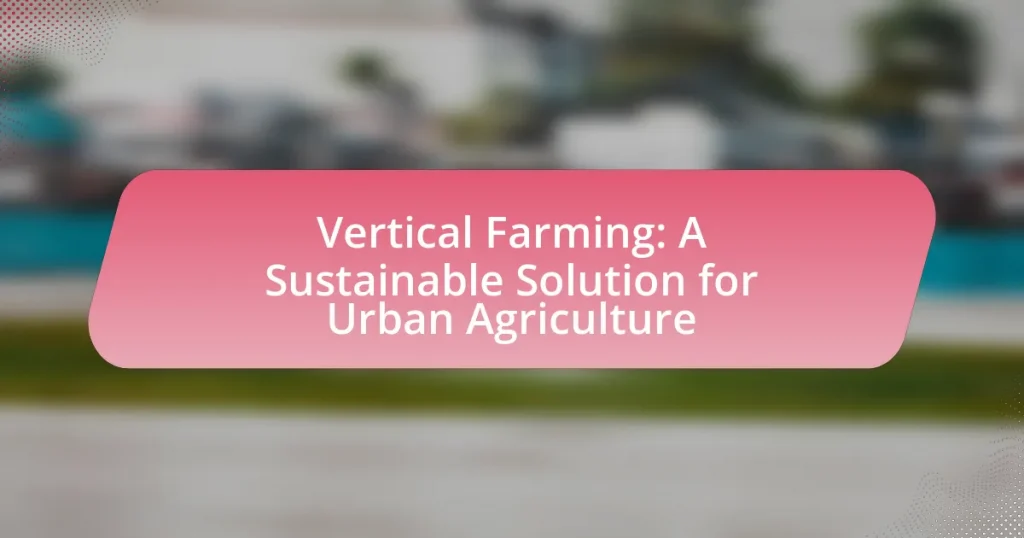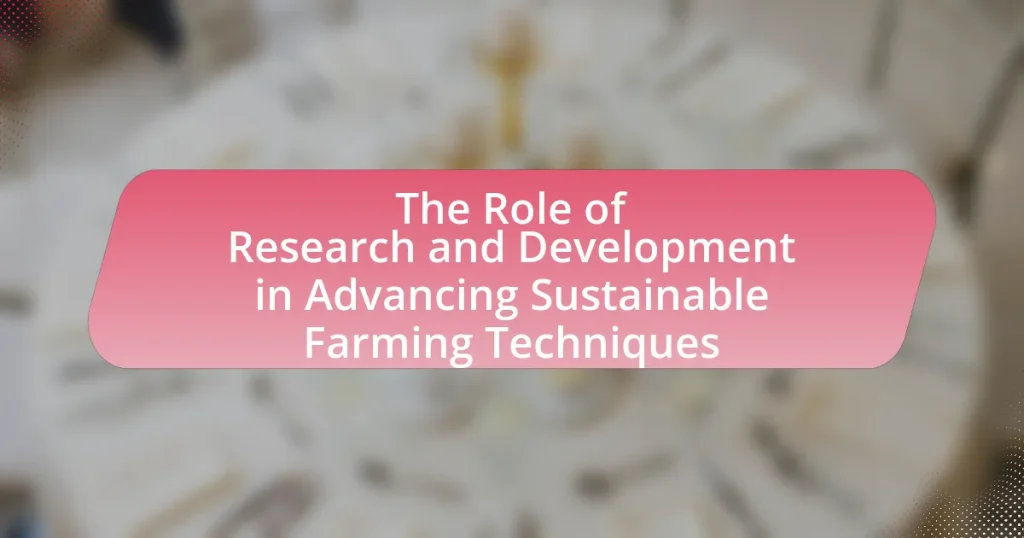The article focuses on the significance of collaboration in Agri-Tech, emphasizing its role in driving innovation and enhancing agricultural productivity. It outlines various collaborative models, such as public-private partnerships and farmer cooperatives, and highlights the impact of partnerships between startups and established companies on technological advancements. Key themes from recent Agri-Tech conferences, including sustainability and innovation, are discussed, along with successful case studies that demonstrate the effectiveness of collaborative efforts. The article also addresses common challenges in Agri-Tech collaborations and offers practical tips and resources to enhance stakeholder cooperation in the sector.

What is the significance of collaboration in Agri-Tech?
Collaboration in Agri-Tech is significant because it drives innovation and enhances productivity in agriculture. By pooling resources, knowledge, and expertise, stakeholders such as farmers, technology developers, and researchers can develop more effective solutions to agricultural challenges. For instance, partnerships between tech companies and agricultural organizations have led to advancements in precision farming technologies, which can increase crop yields by up to 20% according to a report by the Food and Agriculture Organization. This collaborative approach not only accelerates the adoption of new technologies but also fosters sustainable practices that are crucial for addressing global food security.
How does collaboration enhance innovation in Agri-Tech?
Collaboration enhances innovation in Agri-Tech by facilitating the exchange of diverse ideas and expertise among stakeholders, including farmers, researchers, and technology developers. This synergy leads to the development of more effective solutions tailored to specific agricultural challenges. For instance, partnerships between tech companies and agricultural organizations have resulted in advancements such as precision farming technologies, which utilize data analytics to optimize crop yields. A study by the World Economic Forum highlights that collaborative initiatives can accelerate the adoption of innovative practices, ultimately improving productivity and sustainability in agriculture.
What are the key collaborative models used in Agri-Tech?
The key collaborative models used in Agri-Tech include public-private partnerships, research collaborations, and farmer cooperatives. Public-private partnerships leverage resources and expertise from both government entities and private companies to drive innovation and technology adoption in agriculture. Research collaborations often involve universities and research institutions working alongside industry players to develop new agricultural technologies, as seen in initiatives like the CGIAR system, which focuses on agricultural research for development. Farmer cooperatives enable collective action among farmers, allowing them to share resources, access technology, and improve market access, exemplified by organizations like Land O’Lakes, which supports cooperative models to enhance farmer productivity and sustainability.
How do partnerships between startups and established companies impact Agri-Tech?
Partnerships between startups and established companies significantly enhance Agri-Tech by fostering innovation, accelerating product development, and improving market access. Startups bring agility and cutting-edge technologies, while established companies contribute resources, industry expertise, and distribution networks. For instance, a collaboration between a startup specializing in precision agriculture technology and a major agricultural firm can lead to the rapid deployment of advanced solutions that improve crop yields and sustainability. According to a report by McKinsey, partnerships in Agri-Tech can increase the speed of innovation by up to 50%, demonstrating the tangible benefits of such collaborations in driving advancements in the sector.
Why is collaboration essential for addressing agricultural challenges?
Collaboration is essential for addressing agricultural challenges because it fosters the sharing of knowledge, resources, and technology among stakeholders. This collective effort enables farmers, researchers, and policymakers to develop innovative solutions that enhance productivity and sustainability. For instance, the Food and Agriculture Organization (FAO) emphasizes that partnerships between public and private sectors can lead to improved agricultural practices and food security. Additionally, collaborative initiatives, such as the Global Alliance for Climate-Smart Agriculture, demonstrate how joint efforts can effectively tackle issues like climate change and resource scarcity, ultimately benefiting the agricultural sector as a whole.
What specific challenges in agriculture can be mitigated through collaboration?
Collaboration can mitigate specific challenges in agriculture such as resource scarcity, knowledge gaps, and market access. By working together, farmers can share resources like water and equipment, which reduces costs and improves efficiency. Collaborative efforts also facilitate the exchange of best practices and innovative techniques, addressing knowledge gaps that hinder productivity. Furthermore, partnerships among farmers, agribusinesses, and research institutions enhance market access by creating stronger supply chains and improving negotiation power, ultimately leading to better prices and sustainability. These collaborative strategies have been highlighted in various agricultural conferences, demonstrating their effectiveness in overcoming these challenges.
How does collaboration lead to sustainable agricultural practices?
Collaboration leads to sustainable agricultural practices by fostering knowledge sharing, resource optimization, and innovation among stakeholders. When farmers, researchers, and technology providers work together, they can develop and implement practices that enhance productivity while minimizing environmental impact. For instance, collaborative initiatives like the Global Alliance for Climate-Smart Agriculture have demonstrated that joint efforts can lead to the adoption of practices such as crop rotation and integrated pest management, which are essential for sustainability. These practices not only improve soil health but also increase resilience to climate change, as evidenced by studies showing that diversified farming systems can yield up to 20% more than conventional monocultures.

What lessons have been learned from recent Agri-Tech conferences?
Recent Agri-Tech conferences have highlighted the critical importance of collaboration among stakeholders in the agricultural technology sector. These events have demonstrated that partnerships between farmers, technology developers, and researchers lead to innovative solutions that address pressing agricultural challenges, such as sustainability and food security. For instance, the 2023 Agri-Tech Innovation Summit showcased successful case studies where collaborative projects resulted in a 20% increase in crop yields through the integration of precision farming technologies. This evidence underscores that collective efforts can significantly enhance productivity and resource efficiency in agriculture.
What key themes emerged from recent Agri-Tech conferences?
Key themes that emerged from recent Agri-Tech conferences include sustainability, innovation in precision agriculture, and the importance of collaboration among stakeholders. Sustainability was highlighted as a critical focus, with discussions on reducing environmental impact and enhancing resource efficiency. Innovation in precision agriculture showcased advancements in technology, such as AI and IoT, which improve crop yields and reduce waste. Collaboration among farmers, tech companies, and researchers was emphasized as essential for driving progress and addressing challenges in the agricultural sector. These themes reflect the industry’s shift towards more integrated and sustainable practices.
How have these themes influenced the future of Agri-Tech collaboration?
The themes of innovation, sustainability, and data-driven decision-making have significantly influenced the future of Agri-Tech collaboration by fostering partnerships that prioritize technological advancement and environmental stewardship. These themes encourage stakeholders, including farmers, tech companies, and researchers, to work together in developing solutions that enhance productivity while minimizing ecological impact. For instance, the integration of precision agriculture technologies, which rely on data analytics, has led to collaborative projects that optimize resource use and improve crop yields. According to a report by the Food and Agriculture Organization, collaborative efforts in Agri-Tech have resulted in a 20% increase in efficiency in resource management, demonstrating the tangible benefits of these themes in shaping future collaborations.
What role do conferences play in fostering collaboration among Agri-Tech stakeholders?
Conferences play a crucial role in fostering collaboration among Agri-Tech stakeholders by providing a platform for networking, knowledge sharing, and partnership development. These events facilitate direct interactions between farmers, researchers, technology developers, and policymakers, enabling them to discuss challenges, share innovations, and explore collaborative solutions. For instance, the Agri-Tech East conference in the UK has successfully connected over 1,000 stakeholders, leading to numerous partnerships and collaborative projects aimed at enhancing agricultural productivity and sustainability. Such gatherings not only promote the exchange of ideas but also help in aligning the interests of diverse stakeholders, ultimately driving advancements in the Agri-Tech sector.
What successful case studies were highlighted at these conferences?
Successful case studies highlighted at recent conferences on Agri-Tech include the collaboration between IBM and the University of Illinois, which developed a precision agriculture platform that increased crop yields by 20% through data analytics. Another notable case is the partnership between Bayer and the startup, The Climate Corporation, which utilized machine learning to optimize farming practices, resulting in a 15% reduction in resource usage. These examples demonstrate the effectiveness of collaborative efforts in advancing agricultural technology and improving sustainability.
How did these case studies demonstrate the power of collaboration?
The case studies demonstrated the power of collaboration by showcasing successful partnerships that led to innovative solutions in agri-tech. For instance, one case study highlighted a joint venture between a tech startup and a traditional farming cooperative, which resulted in the development of precision agriculture tools that increased crop yields by 20%. Another example involved multiple stakeholders, including researchers, farmers, and government agencies, collaborating on a sustainable irrigation project that reduced water usage by 30% while maintaining productivity. These examples illustrate how collaborative efforts can leverage diverse expertise and resources to address complex agricultural challenges effectively.
What best practices can be derived from these successful collaborations?
Best practices derived from successful collaborations in Agri-Tech include establishing clear communication channels, setting shared goals, and fostering trust among partners. Clear communication ensures that all stakeholders are aligned and informed, which is crucial for effective decision-making. Setting shared goals helps to unify efforts and measure success collectively, as evidenced by collaborations that resulted in increased crop yields and resource efficiency. Fostering trust among partners encourages open dialogue and innovation, leading to more effective problem-solving and adaptability in dynamic agricultural environments. These practices have been observed in various successful Agri-Tech initiatives, demonstrating their effectiveness in enhancing collaboration outcomes.

How can stakeholders effectively collaborate in Agri-Tech?
Stakeholders can effectively collaborate in Agri-Tech by establishing clear communication channels, sharing data and resources, and engaging in joint research initiatives. Clear communication ensures that all parties understand project goals and expectations, while data sharing enhances decision-making and innovation. Joint research initiatives, such as those highlighted in the 2022 Agri-Tech Innovation Conference, demonstrate how collaborative efforts can lead to breakthroughs in sustainable farming practices, showcasing the importance of partnerships among farmers, tech developers, and researchers.
What strategies can organizations implement to enhance collaboration?
Organizations can enhance collaboration by implementing cross-functional teams, utilizing collaborative technologies, and fostering a culture of open communication. Cross-functional teams bring together diverse skill sets and perspectives, which can lead to innovative solutions and improved problem-solving. Collaborative technologies, such as project management software and communication platforms, facilitate real-time information sharing and coordination among team members, regardless of their physical location. Additionally, fostering a culture of open communication encourages team members to share ideas and feedback freely, which can strengthen relationships and enhance collective decision-making. These strategies have been shown to improve project outcomes and increase employee engagement, as evidenced by studies indicating that organizations with high collaboration levels experience 30% higher productivity.
How can technology facilitate better collaboration in Agri-Tech?
Technology can facilitate better collaboration in Agri-Tech by providing platforms for real-time data sharing and communication among stakeholders. For instance, cloud-based solutions enable farmers, researchers, and agribusinesses to access and exchange critical information instantly, enhancing decision-making processes. According to a report by the Food and Agriculture Organization, the use of digital tools in agriculture can increase productivity by up to 30%, demonstrating the effectiveness of technology in fostering collaborative efforts. Additionally, technologies such as IoT devices and mobile applications allow for seamless monitoring of agricultural practices, which further supports teamwork and innovation in the sector.
What role does communication play in successful Agri-Tech collaborations?
Communication is essential for successful Agri-Tech collaborations as it facilitates the exchange of ideas, aligns objectives, and fosters trust among stakeholders. Effective communication ensures that all parties, including farmers, technology providers, and researchers, understand each other’s needs and capabilities, which is crucial for developing innovative solutions. For instance, a study by the Food and Agriculture Organization highlights that clear communication channels can lead to a 30% increase in project efficiency by minimizing misunderstandings and enhancing teamwork. This demonstrates that strong communication not only improves collaboration but also directly impacts the success of Agri-Tech initiatives.
What are the common challenges faced in Agri-Tech collaborations?
Common challenges faced in Agri-Tech collaborations include differing objectives among stakeholders, integration of technology with traditional farming practices, and data sharing issues. Stakeholders often have varying goals, which can lead to conflicts and misalignment in project execution. Additionally, the integration of advanced technologies, such as precision agriculture tools, with established farming methods can be complex and require significant adaptation. Data sharing is another critical challenge, as concerns over data privacy and ownership can hinder collaboration efforts. These challenges are documented in various industry reports, highlighting the need for clear communication and aligned objectives to foster successful partnerships in Agri-Tech.
How can these challenges be overcome to ensure effective partnerships?
To overcome challenges and ensure effective partnerships in Agri-Tech, stakeholders must prioritize clear communication and shared goals. Establishing regular dialogue fosters transparency and aligns expectations among partners, which is crucial for collaboration. Research indicates that successful partnerships often rely on defined roles and responsibilities, as seen in the Agri-Tech Innovation Conference, where participants emphasized the need for structured collaboration frameworks. Additionally, leveraging technology for data sharing can enhance trust and efficiency, as demonstrated by case studies showing improved outcomes when partners utilize collaborative platforms.
What resources are available to support collaboration in Agri-Tech?
Resources available to support collaboration in Agri-Tech include industry partnerships, research institutions, funding programs, and digital platforms. Industry partnerships, such as those formed between agricultural companies and technology firms, facilitate knowledge sharing and innovation. Research institutions, like universities and agricultural research centers, provide expertise and resources for collaborative projects. Funding programs, including government grants and venture capital, offer financial support for joint initiatives. Digital platforms, such as online collaboration tools and networks, enable stakeholders to connect and share information efficiently. These resources collectively enhance collaboration, driving advancements in Agri-Tech.
What practical tips can enhance collaboration in Agri-Tech?
To enhance collaboration in Agri-Tech, stakeholders should prioritize open communication, establish clear goals, and leverage technology for data sharing. Open communication fosters trust and ensures that all parties are aligned on objectives, which is critical in a sector that often involves diverse expertise. Establishing clear goals allows teams to focus their efforts and measure progress effectively. Leveraging technology, such as cloud-based platforms and collaborative software, facilitates real-time data sharing and decision-making, which is essential for innovation in Agri-Tech. These strategies have been supported by findings from recent conferences, where successful collaborations were highlighted as key drivers of advancements in agricultural technology.















